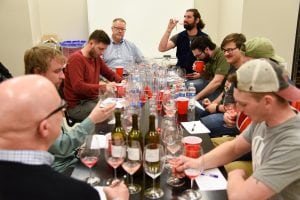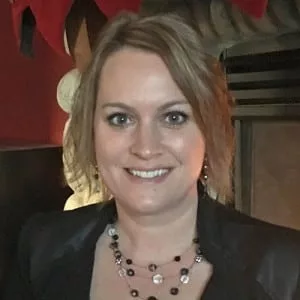
Home » More students set sights on WSU degrees to launch wine industry careers
More students set sights on WSU degrees to launch wine industry careers
120 students now enrolled in viticulture, enology undergraduate program

February 14, 2018
Seven years ago, Becca DeKleine was the lone College of Agriculture student walking at Washington State University’s Tri-Cities campus commencement.
She carried the department’s banner by herself.
She and three others graduated together with an emphasis in viticulture and enology in 2011. The others graduated from the Department of Horticulture. Since then, WSU’s wine and grapes program has experienced significant growth and doesn’t show any sign of slowing.
Currently, 120 students are enrolled in the viticulture and enology undergraduate program and 28 are enrolled in the graduate program. These numbers are just under the total number of students who graduated from the program over the past 13 years combined.
WSU’s viticulture and enology program offers undergraduate, graduate and certification programs at its Richland campus. Since the program’s start in 2004, more than 130 students have earned undergraduate degrees in the field and more than 650 have earned non-degree certificates through online courses; and more than 50 students have earned master’s or doctorate degrees in the field since 2003.

DeKleine, who is now assistant manager and winemaker at Four Feathers Wine Estates in Prosser, credited WSU’s “strong science program” for her success and advancement in the wine industry.
“I couldn’t have my job now if I hadn’t done the program through WSU,” DeKleine said. “The program is very heavy in the sciences and requires an internship to graduate. It’s a great balance of science and practical knowledge.”
After Four Feathers, a division of Zirkle Fruit Co., opened its 50,000-square-foot facility in 2012, DeKleine was hired to work in the lab.
“I managed a lab, which would’ve been nearly impossible without all of the science I experienced at WSU,” DeKleine said.
She gradually worked her way through the ranks at the facility, which crushes more than 15,000 tons of wine grapes per harvest and has more than three million gallons of tank capacity.
“One of the best parts of my job is to mentor the WSU students going through the (viticulture and enology) program. We mentor about 10 juniors and seniors each harvest, but we’d hire more if we could,” DeKleine said. “Their attitudes are contagious. They’re so excited and it reminds me that our industry is a lot of fun.”
The winemaker also works as a mentor in an entry-level WSU class, which helps ensure students have made the right choice pursuing degrees in the wine industry. In addition, she partners with WSU’s Department of Agriculture to help develop the viticulture and enology program and ensure students will have the skills and experiences needed for a successful transition into the industry.
“The WSU program brings us highly-qualified employees,” DeKleine said.
More than $66,000 in viticulture and enology scholarship money is annually awarded, while annual research funding exceeds $3 million.
“It’s a great program and definitely provides a great foundation in the sciences, from grape growing all the way through winemaking,” said Will Wiles, assistant winemaker for Col Solare on Red Mountain.
Wiles spent his first two years in Pullman and the last two attending classes at the WSU Tri-Cities campus, graduating in 2009. He began to work at Col Solare five years ago as an enologist.
“I definitely can use the knowledge I acquired at WSU and apply it in a hands-on way here at Col Solare,” Wiles said. “I really love it; it’s a fun industry. It’s a lot of hard work and challenging, but very rewarding. On the winery side, I get to deal with the wine, plus visit with the people here as they enjoy what we make.”
Wiles said the winery hosts interns from the WSU program, and he continues to collaborate with WSU as chairman of the Washington Wine Technical Group, or WWTG, which provides seminars, research and information for the industry to be the best it can be.
“Our (WWTG) goal is to evaluate the knowledge of everyone in the wine side of the industry. It’s more the technical/science side of it – not the business side of it,” Wiles said.

The university’s dedicated viticulture and enology program launched in 2010.
Previous to that, viticulture and enology was an area of focus in the horticulture program. Graduates earned a degree in horticulture with an emphasis in viticulture and enology. It’s now a viticulture and enology major through integrated plant science.
“Integrated plant science is a fusion between food science and horticulture,” said Kaury Balcom, viticulture and enology communications coordinator. “We have a truly comprehensive viticulture and enology program. Some people may not realize that since 2004, we not only offer graduate and undergraduate degrees, but have also offered non-degree certificates through online courses.”
Upon successfully finishing 18 months of courses, taught by the same faculty as the undergraduate and graduate programs, students earn a certificate in either viticulture or enology.
“We have 35 viticulture and 35 enology students for a total of 70 per year seeking these certificates,” Balcom said. “Some are international students and others register from all over the country. They do come to Tri-Cities or Prosser for hands-on camps to try on what they’ve learned in the online courses.”
WSU’s world-renowned viticulture and enology faculty include seven core members, 11 affiliate members and 15 staff members.
“Our student winemaking project is also thriving,” Balcom said. “Students enrolled in the Blended Learning class each semester get hands-on experience making wine.”
This faculty-led project pairs students with Washington state growers and winemakers to create unique wines under the WSU Blended Learning label. Area residents can buy wines in local stores or at the Walter Clore Wine & Culinary Center in Prosser.
New Blended Learning wines are released annually at the WSU Spring Release Party. This year’s gala is scheduled for March 28 and will include a 2015 Durif (Petite Sirah) made with Kiona Vineyards, 2016 GSM made with Bookwalter, and a 2017 Rosé made with Ancient Lakes Wine Co. The release party, sponsored by Budd’s Broiler, includes a four-course dinner and wine pairing. Tickets will soon be available at wine.wsu.edu, along with online wine purchases.
WSU’s wine-related programs have expanded with the addition of a Wine and Beverage Business Management program through the School of Hospitality Business Management.
Just over two years ago, WSU opened the world’s largest and most technologically advanced wine research and education facility on the Tri-Cities campus — the WSU Ste. Michelle Wine Estates Wine Science Center in Richland.
“Just three years later, we are making plans to expand these facilities with the build-out of the Life Sciences Teaching Lab (at the wine science center),” Balcom said. Construction is expected to begin this year thanks to a $1 million donation from Wine Spectator Magazine last August. Half of the money will be used to build and outfit the lab, while the other half will go toward scholarships.
Another enhancement to the viticulture and enology program was in the form of upgrades and remodels to the Irrigated Agriculture Research and Extension Center in Prosser, Balcom said.
An upcoming change is a new requirement, which is a phased process that will start for next fall’s new enrollees. Viticulture and enology students will be required to spend their junior and senior years at the Tri-City campus. Prior to this change, it was a dual-campus program, Balcom said.
Local News Viticulture
KEYWORDS february 2018





